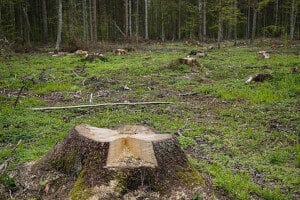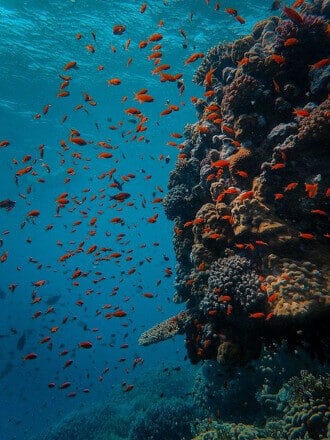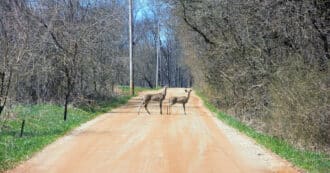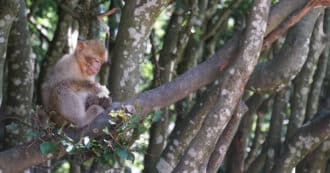By Sydney Cohen – Did you know that human health is directly linked to the health of our natural world? It’s true! The more diverse our ecosystems are, the healthier we all are. Biodiversity is essential for human survival, and it is important that we do everything we can to protect it.
The natural world provides us with many essential resources that we need for survival. Medicines, fresh water, and food are just a few examples of what can be derived from biodiverse ecosystems. Biodiversity is also important for regulating the climate and maintaining soil quality.
Biodiversity is critical to life-supporting processes, which include human lives. Without many animal species and microorganisms, it’s impossible to sustain our healthy ecosystems, which provide our breadth of life and food. Some aspects of biodiversity are highly valued by humans. Human life depends on biodiversity in several ways and it is critical to preserve this resource as much as we can.
Without biodiversity, our planet would be a very different place. In this blog post, we will discuss the importance of biodiversity and why it is so vital for both human beings and our planet.
What Is Biological Diversity?
What is biodiversity? Simply put, biodiversity is the variety of life on Earth. This includes all the different plants, animals, and microorganisms that live in natural habitats around the world. Biodiversity also includes the genetic diversity of these species.
Endemic species are those that are found only in one specific area, and they are often threatened and endangered species at risk of becoming extinct. The loss of biodiversity is a major concern because it could lead to the extinction of many species.
Measuring Biodiversity
Counting species is one way to measure biodiversity, and scientists have estimated that there are anywhere from 3 to 30 million species on earth! Coral reefs are home to immense biodiversity, and are often called “the rainforest of the sea.” Unfortunately, coral reefs have suffered much biodiversity loss, due to climate change, which will be elaborated on shortly.
Genetic and Chemical Biodiversity
Genetic diversity represents the alternative concept for biodiversity. Molecular variations are a source of adaptation for many species. A species’ future adaptive potential depends upon the genetic diversity in its genome.
The negative impact of climate change is that extinction increases and genetic defects are closely connected to the warming of the planet. Species and their ecosystems, as well as ecosystem services, are suffering due to the warming of our planet. Their genomes cannot adapt quickly enough to survive on our planet.
As mentioned, humans depend on biodiversity within ecosystems. Part of the importance of biodiversity is that often, both medicinal plants and manufactured pharmaceuticals create modern drugs by studying the earth’s biodiversity. Maintaining our earth’s biodiversity, for both ecosystem and human health, requires ecological balance.
What Are Ecosystem Services?
Ecosystem services are the benefits that humans receive from ecosystems. These benefits can include the provision of food, water, and fiber; regulation of climate and air quality; support of human health and well-being; maintenance of soil productivity and cultural enrichment. Biodiversity is essential to the provision of these benefits, so it is important to protect biodiversity in order to maintain the health of our ecosystems.
Many healthy ecosystems provide biological resources that we, as humans, would otherwise not have access to. This is why it is important to prevent climate change, which results in biodiversity loss in ecosystems.
Moving Toward Sustainable Development
Given that healthy biodiversity offers humans a variety of natural benefits, a shift towards sustainable development is logical for both economic and environmental reasons. Sustainable development has been gaining popularity over the last decade, as it is more economically friendly and better for the environment! But, it is important to realize that sustainable development can specifically protect and preserve our Earth’s ecosystems, maintaining biodiversity which is vital to human life.
Healthy Ecosystems
In order to understand how to protect our environment, we need to know what a healthy ecosystem looks like. Studies have shown that in order for an ecosystem to be productive, it must have a rich biodiversity.
Rich biodiversity, found in healthy ecosystems, leads to ecosystem diversity, and in turn, ecosystem productivity. Biodiversity hotspots with rich biodiversity are often found in national parks, where the different ecosystems are free to develop within protected areas. Productive ecosystems generate nutrient storage, nutrient cycling, and some ecosystems even provide raw materials such as wood, biofuels, and plant oils to the world’s economy, aiding in economic development.
Biodiverse ecosystems can also provide natural soil fertility, pest control, and food production, which, as you might deduct, have high value to agricultural scientists, and agriculture industries that grow food and provide food sources for the human population.
Current Species Diversity
Although efforts are devoted, understandings about the exact number of species that live on our planet are very limited. Research has shown that eukaryote species, which are organisms that contain a nucleus and other organelles in their cells, account for less than 20% of total species. This means that there are so many species out there!
Estimation of the number of prokaryotic species, which are single-celled organisms that lack a distinct membrane-bound nucleus in their cells, are primarily guesses. Biologists say science only recently began cataloging prokaryotic diverse nature, due to the complexity of the number of prokaryotic species.
Species Depend on Each Other
In certain species, there may be survival of the fittest, but all animals are dependent on other species to survive. Such is the food chain, for example. Species’ dependence on one another, in some cases known as symbiotic relationships, enables cooperation that is focused on the reciprocal survival of the species and is often key to balanced ecosystems.
Biodiversity Loss
Unfortunately, due to the warming of our planet with climate change, our ecosystems have been facing much biodiversity loss. While habitat restoration efforts can be useful, some ecosystems are harmed beyond repair.
Coral Reefs And Biodiversity Loss
Coral reefs were once home to hundreds of thousands of species. The high level of species diversity allowed for ecosystem productivity, where species relied on one another for survival, and also benefitted each other.
Climate change has resulted in ocean acidification, where the ocean’s rising acidic levels have resulted in coral bleaching. Coral bleaching is a process where the colorful algae that make coral so beautiful are expelled from the coral polyps, as the rising ocean temperatures and acid levels make it impossible for some species to survive.
Human Dependence
There is immense economic value in biodiversity. Biodiversity, which helps with discoveries in crop pollination, water purification, flood protection and carbon sequestration, is necessary for our economy. Human life on earth depends on particular industries that need the ecosystem services that biodiversity allows for.
In fact, there are many conservation efforts to create more protected areas, as industries such as agriculture, fisheries and forestry rely on biodiverse ecosystems. Tropical forests, despite only taking up a small percentage of our planet, are a geographical area home to many wild animals, and they “support at least two-thirds of the world’s biodiversity.” However, due to deforestation, we are losing much of this biodiversity that is essential to the previously listed aspects of our world’s economy. It is more important to conserve our forests than it is to cut them down for various economic opportunities, in order to preserve our ecosystems and make use of the rich biodiversity that allows other human industries to thrive.
Biodiversity and Religion
The following essay appears on Canfei Nesharim and in the book Eco Bible Volume 2. Leviticus 22:28 – No animal from the herd or from the flock shall be slaughtered on the same day with its young.
Safeguarding Biodiversity: Ora Sheinson
When the Torah prohibits slaughter of a mother and calf on the same day, Rabbi Moshe ben Nachman (Nachmanides; Ramban) indicates that God is telling us not to eliminate a species. He offers the same comment on the biblical commandment to send away a mother bird before taking eggs from a nest found in the wild. Both prohibitions revolve around the killing of two generations, an act symbolic of the destruction of a species’ ability to persist.
The species of planet earth are increasingly endangered. Zoologist Edward O. Wilson estimates that “if we continue at the current rate of deforestation and destruction of major ecosystems like rainforests and coral reefs, where most of the biodiversity is concentrated, we will surely lose more than half of all the species of plants and animals on earth by the end of the 21st century.”
Humans need biodiversity and benefit from it in immeasurable ways. Many of our most potent medicines come from the plants and animals that God put on earth. Aspirin from the willow tree, vincristine (for childhood leukemia) from the rosy periwinkle of Madagascar, and painkillers from cone snails, snake venom, and frog skin poison. What if the willow tree or periwinkle had gone extinct before we discovered their medicinal properties?
The Midrash tells the story of King David who, as a young boy, asked why God created spiders. God answered that there would come a day when David would need a spider and then, he would thank God for creating it. Years later, when David incurred the wrath of King Saul, David escaped into a cave to hide. He heard soldiers near the cave and thought they would find him. Suddenly, a spider appeared in front of the cave and spun a web across the opening. The soldiers did not look in David’s cave but assumed he would have torn the web when he entered. His life saved by a spider, David understood God’s wisdom and thanked God for creating all creatures. (Ben Sira 23b, Otzar Midrashim 47)
Today, scientists discuss biodiversity in terms of “webs.” The more we learn about biodiversity, the more we begin to see its weblike strengthening of every kind of ecosystem against disturbances. Diversity brings stability to an ecosystem because the greater the species’ diversity, the greater the potential for species adaptation and the higher the chance that variation will persist. Species diversity preservation is within our reach. Through our actions, we can adhere to God’s commandment to honor the importance of all that God has created.
The Torah’s outlook is generally one of respect and recognition for all species and has important ramifications for biodiversity issues today. The Talmud teaches, “Rabbi Judah said in the name of Rav: Everything that the Holy One, Blessed Be, created in God’s world, God did not create a single thing in vain.” In Genesis, God looked at all that God created and saw that it was very good. Since then, the vast diversity of life on the planet has not gone unnoticed by the rabbis. The Midrash notes in the name of Rabbi Acha bar Rabbi Hanina (4th century CE) that “everything you see as superfluous in this world – like snakes and scorpions – are part of the greater scheme of the creation of the world.”
Spreading Awareness of Biodiversity Importance
The economic value of biodiversity is immense, and it provides a wide range of benefits which are essential to the global economy. Human use of biodiversity and climate regulation are just two examples of the many ways in which this natural resource impacts our lives.
It is clear that we must do everything possible to protect and conserve biodiversity if we want to maintain our standard of living, and protect life on earth for future generations.
* Featured image source







